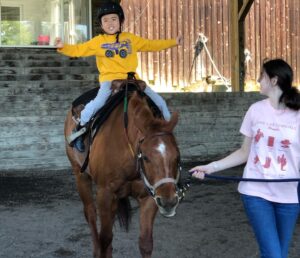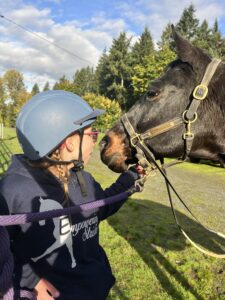 “Horse therapy” is a term I generally avoid using, primarily because it often implies that the therapy is conducted by a doctor or a licensed professional, which I am not. Despite this, the term is widely used in various contexts. This became particularly evident to me when I observed a request for ‘horse therapy’ recommendations in a large Facebook group. The responses included several local programs offering a range of services. But it led me to wonder: what exactly was the individual seeking? The benefits that horses provide are diverse and numerous, and the term ‘horse therapy’ can encompass a broad spectrum of activities and outcomes.
“Horse therapy” is a term I generally avoid using, primarily because it often implies that the therapy is conducted by a doctor or a licensed professional, which I am not. Despite this, the term is widely used in various contexts. This became particularly evident to me when I observed a request for ‘horse therapy’ recommendations in a large Facebook group. The responses included several local programs offering a range of services. But it led me to wonder: what exactly was the individual seeking? The benefits that horses provide are diverse and numerous, and the term ‘horse therapy’ can encompass a broad spectrum of activities and outcomes.
- In our industry we use the term ‘Equine Assisted Services’, which encompasses several distinct practices:
Equine Assisted Psychotherapy:
- This is conducted by a licensed mental health therapist in the presence of horses, typically involving groundwork. These services may be covered by insurance.
Hippotherapy:
- Often focused on physical therapy performed by a licensed therapist using horses, this can also include occupational or speech therapy. While some programs may cater to specific disabilities, others might employ only one type of licensed therapist. These services may also be covered by insurance.
- These programs also have a larger accommodation for physical disabilities than other programs may have. For example, wheelchair ramps, which we at Empowering Strides do not.
Therapeutic Riding:
- This is a recreational activity aimed at improving the cognitive, physical, emotional, and/or social well-being of riders, usually those with disabilities.
- These programs may have a certain focus or population that they work with. At Empowering Strides our focus is 4-18 year old’s with cognitive, behavioral or emotional challenges. Although riding has physical benefits, that is not our primary focus.
- Best practice is for instructors to be certified and many insurance companies are now requiring this. The two major certification programs are The Professional Association of Therapeutic Horsemanship International (PATH) and Certified Horsemanship Association. Empowering Strides instructors are PATH certified.
Equine Assisted Learning:
- This experiential learning approach focuses on developing social, emotional, and life skills. Programs vary greatly, ranging from academic subjects like reading and math to professional skill development like team building.
- There are a vast variety of programs from reading and math to team building and professional groups. Like all equine assisted services, each program may specialize or focus on a certain population or learning style.
Given the diversity of these programs and their specializations, accurate recommendations require detailed understanding. For example, if your 16-year-old with a traumatic brain injury needs speech therapy, a program offering equine assisted learning wouldn’t be suitable. Similarly, for someone suffering from trauma due to domestic violence needing equine assisted psychotherapy, therapeutic horseback riding or Empowering Strides might not be the best fit. For a 6yr old Autistic child working on social and emotional development, therapeutic riding like Empowering Strides offers, would be a great fit.
- For recommendations tailored to specific equine assisted services, please email me at Laura@EmpoweringStrides.com. Include a brief description of your service needs, and I’ll connect you with a program that can best accommodate your requirements.
- -Laura Ambrose Gorcester


